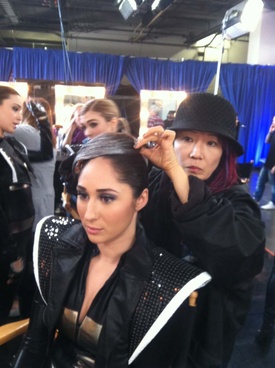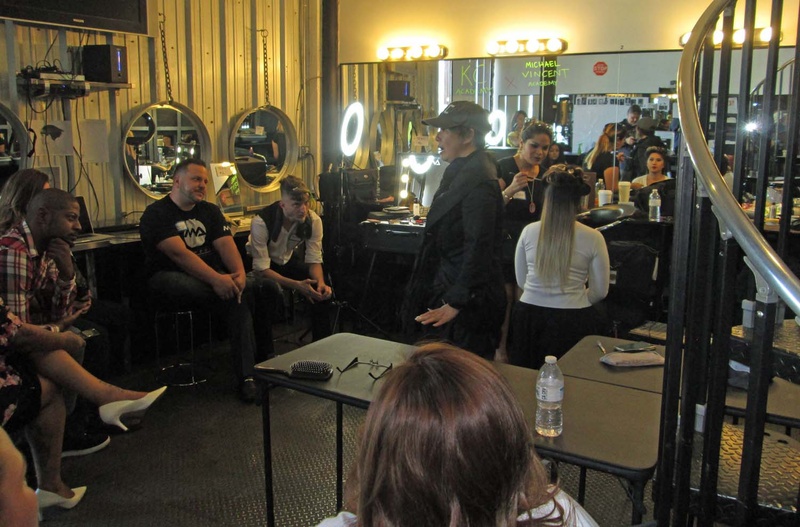Shelved her dream to go abroad and became a hairdresser. She entrusted her dreams to her daughters and went to the United States.
I knew the name of Yuko T. Koach (Japanese name: Yuko Tokunaga), who was the hair stylist for "Memoirs of a Geisha" and Michael Jackson's final work "This Is It". I heard that she was going to be a lecturer at a workshop at a beauty school in Little Tokyo one day in August, so I went to see it. Yuko was smiling as she instructed the students on how to put on hair extensions, sharing stories from her time on the set in Hollywood. It wasn't until I heard her story that I found out she was the owner of the school, KC Beauty Academy. She is a superwoman with many faces, active at the forefront of Hollywood, running a school, and also running salons in Little Tokyo and Pasadena.
Having worked in television and film in Japan, including on "Yoru no Hit Studio," one would naturally assume that her reason for moving to the U.S. was for her own career, but... "I wanted my daughters to receive an American education, so I came to the U.S. when my oldest daughter was three years old and my youngest was three months old," says Yuko. And now she is also a mother.
Yuko, who is originally from Kobe, recalls that she had a strong desire to go abroad from an early age. "I grew up in an environment where there were foreigners in my neighborhood, and I was fascinated by the bread they ate, which was different from Japanese bread. When I went to kindergarten, there were foreign children there too, and I would approach them myself. I was a child who responded to different cultures."
However, her strict father, a member of the Showa era, wanted her to get married normally and take over the company he ran. Yuko, who respected her father, put her dreams of going abroad on hold. As a result, she heard from her father's third wife (Yuko's stepmother) that she had wanted to be a hairdresser in the past, and decided to pursue a career in the beauty industry.
She married a Korean man in her 20s. At the time, Yuko was already busy working as a hairdresser and kimono dressing instructor, but as time passed, her workload accelerated. She says she was becoming far from the type of wife her husband wanted. She also hired an English-speaking maid for her two daughters and focused on teaching them language skills even before they started school. She planned to send them to an international school. She entrusted her childhood dreams to her daughters. However, her husband opposed Yuko's educational policy, saying, "It's strange to teach your children English when they can't even speak Japanese yet." The gap between them only widened.
"Eventually, I got divorced and had to abandon those plans for financial reasons."
Sending your daughters to an international school in Japan is expensive, so in 2001, Yuko decided to send them to a local school, so she came to Los Angeles, via Hawaii, to get them a local education. The family of three started a new life in a hotel.
Hollywood's shaken Japanese values and acceptance of diversity have opened the door to new ideas

Her first job in America was dressing people in kimonos. She started out as a kimono dressing consultant, which eventually led to work on the major film "The Last Samurai". Then she moved on to "SAYURI". However, it's safe to say that there are very few Hollywood films in which people actually appear in kimonos. By switching her career from dressing people to hair and makeup, job offers started coming in one after another. She also joined a union. But even so, she says she had some difficulties at first, not understanding the "American way of working".
"Even when everyone else was on break, I would be the only one working, busily tidying up and cleaning, a habit that had been ingrained in me for decades. But it wasn't until someone pointed it out to me that I realised that in America, it's taboo to help with things that aren't your own work. I was shocked, thinking, 'Is this a free country, America? Am I not allowed to freely do what I want?' Part of it is that I'm an impatient person, but up until then I would just move my body even without being told to. In Japan, that kind of thoughtfulness is appreciated, right? So it took me a while to get used to the differences from Japan."
He also once showed an actress how to dress correctly, as he had learned in Japan, but she rejected it. "Women tuck up their kimonos to adjust the length, so excess fabric spills out under the obi. The actress wanted to wear it by dragging it along like a dress train, so she pulled out the tucked up parts herself. This is something that would never be considered in Japan, so I was shocked, but at the same time, it opened the door to new ideas within myself. This happened several times, and I realized that this is what diversity is all about, and that because countries are different, people don't necessarily enjoy the same things I do in Japan. It took me seven years after moving to the US to reach that point."
Her daughters helped her with the language aspect: "Because I didn't know anything, they explained to me how popular the actors I was working with were, and read the scripts for me and taught me. Their help was a huge help. They acted like mothers to me in America."
He is currently in charge of hair styling for the hugely popular TV shows "America's Got Talent" and "So You Think You Can Dance." We asked him a simple question about why he is constantly working on the set.
"Colleagues who worked together on set introduce each other to each other. You see each other's work on set, right? So you want to work with someone who is good at their job in the next job. So even if the show changes, the same members continue as a team. Also, if there is an Asian person in the cast, almost always someone will introduce her and say, 'Yuko would be good,' and she will be asked to join. Now my coworkers are like family to me."
Speaking of her family, she married Glenn in 2005, and now has a family of four. Her eldest daughter, Miku, is 21 and studying English at UCLA, and her second daughter, Reno, is 19.
"My reason for moving to the US was for my children's education, but I think it was the right decision for me too. I'm grateful that I've been able to continue working this long, and I want to give back to America. My current challenge is how to convey to Japan what I've learned in the American industry."
The day when Yuko breathes fresh air into Japan's beauty industry may not be far off.
© 2016 Keiko Fukuda






